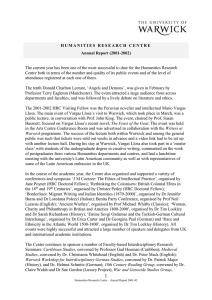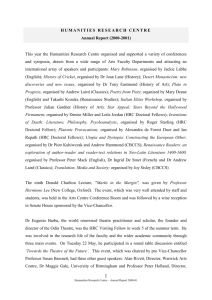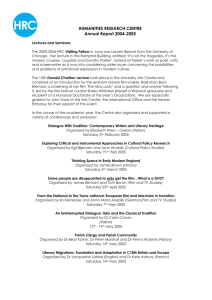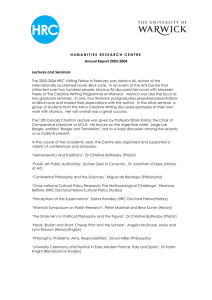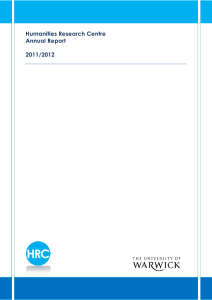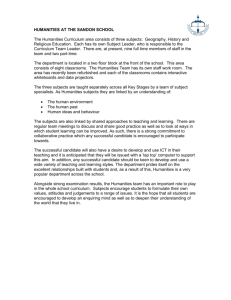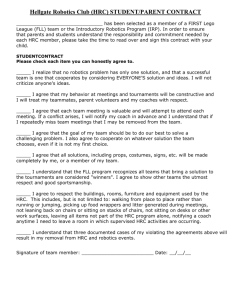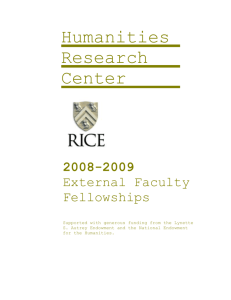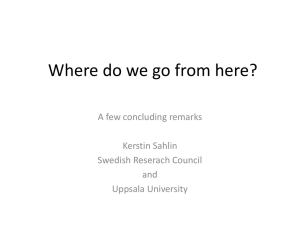Humanities Research Centre
advertisement
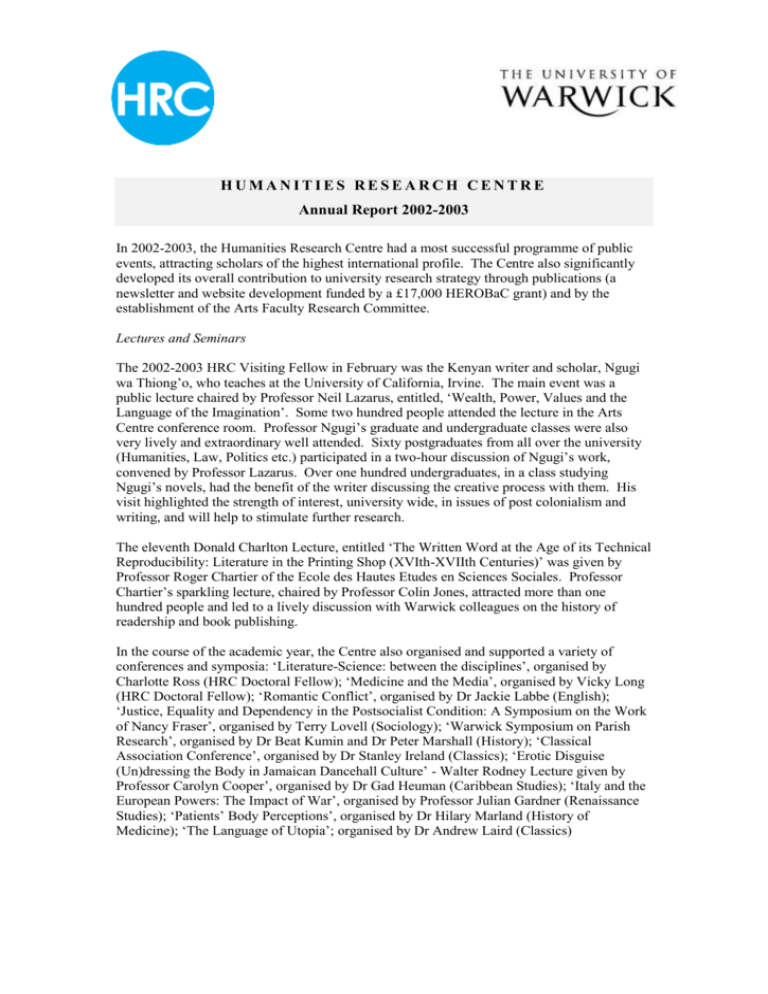
HUMANITIES RESEARCH CENTRE Annual Report 2002-2003 In 2002-2003, the Humanities Research Centre had a most successful programme of public events, attracting scholars of the highest international profile. The Centre also significantly developed its overall contribution to university research strategy through publications (a newsletter and website development funded by a £17,000 HEROBaC grant) and by the establishment of the Arts Faculty Research Committee. Lectures and Seminars The 2002-2003 HRC Visiting Fellow in February was the Kenyan writer and scholar, Ngugi wa Thiong’o, who teaches at the University of California, Irvine. The main event was a public lecture chaired by Professor Neil Lazarus, entitled, ‘Wealth, Power, Values and the Language of the Imagination’. Some two hundred people attended the lecture in the Arts Centre conference room. Professor Ngugi’s graduate and undergraduate classes were also very lively and extraordinary well attended. Sixty postgraduates from all over the university (Humanities, Law, Politics etc.) participated in a two-hour discussion of Ngugi’s work, convened by Professor Lazarus. Over one hundred undergraduates, in a class studying Ngugi’s novels, had the benefit of the writer discussing the creative process with them. His visit highlighted the strength of interest, university wide, in issues of post colonialism and writing, and will help to stimulate further research. The eleventh Donald Charlton Lecture, entitled ‘The Written Word at the Age of its Technical Reproducibility: Literature in the Printing Shop (XVIth-XVIIth Centuries)’ was given by Professor Roger Chartier of the Ecole des Hautes Etudes en Sciences Sociales. Professor Chartier’s sparkling lecture, chaired by Professor Colin Jones, attracted more than one hundred people and led to a lively discussion with Warwick colleagues on the history of readership and book publishing. In the course of the academic year, the Centre also organised and supported a variety of conferences and symposia: ‘Literature-Science: between the disciplines’, organised by Charlotte Ross (HRC Doctoral Fellow); ‘Medicine and the Media’, organised by Vicky Long (HRC Doctoral Fellow); ‘Romantic Conflict’, organised by Dr Jackie Labbe (English); ‘Justice, Equality and Dependency in the Postsocialist Condition: A Symposium on the Work of Nancy Fraser’, organised by Terry Lovell (Sociology); ‘Warwick Symposium on Parish Research’, organised by Dr Beat Kumin and Dr Peter Marshall (History); ‘Classical Association Conference’, organised by Dr Stanley Ireland (Classics); ‘Erotic Disguise (Un)dressing the Body in Jamaican Dancehall Culture’ - Walter Rodney Lecture given by Professor Carolyn Cooper’, organised by Dr Gad Heuman (Caribbean Studies); ‘Italy and the European Powers: The Impact of War’, organised by Professor Julian Gardner (Renaissance Studies); ‘Patients’ Body Perceptions’, organised by Dr Hilary Marland (History of Medicine); ‘The Language of Utopia’; organised by Dr Andrew Laird (Classics) The Interdisciplinary Research Seminar The Centre also sponsors an ‘Interdisciplinary Research Seminar in the Humanities’, which this year saw the launch of a revised structure. Two series were held, ‘Arts of War’ in the autumn term, organised by Dr Michael John Kooy (English) and ‘Images of China’ in the spring, organised by Dr Anne Gerritsen (History). Doctoral Fellowships This year, the Centre has continued to sponsor two (internal) Doctoral Fellowships. The Fellows contribute to the life of the HRC by organising a one-day post-graduate interdisciplinary conference, and are given financial support for their PhD dissertation research. The two fellowships for 2003-2004 were assigned to Eleonora Belfiore (Cultural Policy Studies) ‘Cross-national Cultural Policy Research: the methodological challenge’ and Sasha Handley (History) ‘Perceptions of the Supernatural in the Long Eighteenth Century’ Warwick Humanities Series The Warwick Humanities Series, published by the Humanities Research Centre in collaboration with Ashgate, aims to bring together innovative work of a high academic standard which crosses disciplinary borders in the Arts and Humanities. It provides a forum for volumes exploring new dimensions of cultural history from the early modern period to the present, and for works that investigate aspects of contemporary cultural production within and across national boundaries. The series reflects the breadth of the interdisciplinary work carried out at Warwick's Humanities Research Centre, and includes work of both European and extra-European scope. The series is edited by Dr. Loredana Polezzi (Italian Studies) Dr. Karen O’Brien (English & Comparative Literature) and Dr Sam Haigh (French). The series received a number of new book proposals. A collection of essays on Italo Calvino and a monograph on George Eliot and European culture have already been approved for publication, while proposals for volumes on Umberto Eco, Borges, Silone, Political Theatre and Cold War Literature are being evaluated, amongst others. New Developments in Research Strategy In 2002-2003, the HRC took a number of important initiatives that melded with overall university research strategy. In March 2003, the Arts Faculty Research Committee was established and in May Dr Margot Finn was elected as chair of that committee for 2003-2004. This important new initiative seeks to promote research within the Faculty of Arts at all levels and to support a high quality research environment within the Faculty; to provide a forum in which Faculty-wide research issues can be addressed (e.g. the strategic implications of larger funding opportunities, interdisciplinary bids and specific research initiatives); and to provide a Faculty voice on research issues, especially to external funding bodies, but also internally. This is particularly important in light of the fact that the AHRB will become the Arts and Humanities Research Council by the end of the next academic year. It was also seen as important to establish an Arts Faculty body to complement and interact with the Social Studies Faculty Research Committee which plays a vital and proactive role in the research activities of its own faculty, to liase with the University Research Strategy Group, which was convened for the first time in the summer term 2003, and to inform the Arts Faculty representatives who sit on the above Group. A representative from each Arts Faculty Department sits on the Faculty Research Committee in addition to the Faculty Chair and the Faculty Research Link Officer. The HRC also provides funds for another research planning group convened by Dr Margot Finn and Dr Karen O’Brien, in which younger scholars in Humanities meet to discuss the possibilities of future interdisciplinary collaboration. Both of the above groups report to Professor Palmer’s research strategy group. The Humanities Research Fund, administered by the Centre, continued to give support for research projects, conference travel and unusual publication expenses. The fund has been in operation since October 2001. In this period, the HRC also successfully bid for a £17,000 grant from the HEROBaC budget. This initiative, developed by Dr Perrin, the Research Development Manager (Arts) gave funds for three important ‘outreach’ initiatives: to develop the HRC website, to publish an HRC newsletter that focuses on the research achievements and interests of the Humanities faculty and to provide funds to invite a further speaker to the HRC. The HRC administrator Ms Sue Dibben and Dr Liese Perrin worked on upgrading the website, and Dr Perrin took the leading responsibility for commissioning and editing articles for the newsletter. At the moment of writing, in August 2003, we are awaiting copies of the newsletter, which will be mailed out to some 2000 people (research on target audiences took place in May). This is an excellent initiative and I hope that there will be funds to continue editing the newsletter, perhaps in an expanded form, on an annual basis. Future Projects The HRC programme for 2003-2004 will continue to set high standards. Professor Efrain Kristal, Chair of Comparative Literature at UCLA will give the next Donald Charlton Lecture entitled ‘Borges and Translation’. We are looking, in conjunction with the Arts Centre, to invite Iran’s two leading women filmmakers, Rakhshan Bani-Etemad and Samira Makhmalbaf, to the university to screen and discuss their new films. We had asked the distinguished playwright, novelist and critic Ariel Dorfman (currently at Duke University) to be the 2003-2004 Visiting Fellow. He has accepted our offer, but wishes to defer until 20042005 due to a pressure of commitments in the next twelve months (three plays being staged on Broadway and in London, a television series to write and a novel to complete). We are thus looking to secure our Visiting Fellow for 2003-2004 and have invited the novelist Vikram Seth. Our current strategy, which has been most successful over the past three years, is to invite some of the world’s most important creative artists for the post of Visiting Fellow. We have managed this so far on our very small annual budget. Indeed, as can be seen above, the Centre overall achieves a very great deal with few resources and a small staff that comprises the director, the secretary/ administrator, Ms Sue Dibben and Dr Liese Perrin. Professor John King HRC Director, 2002-2003
